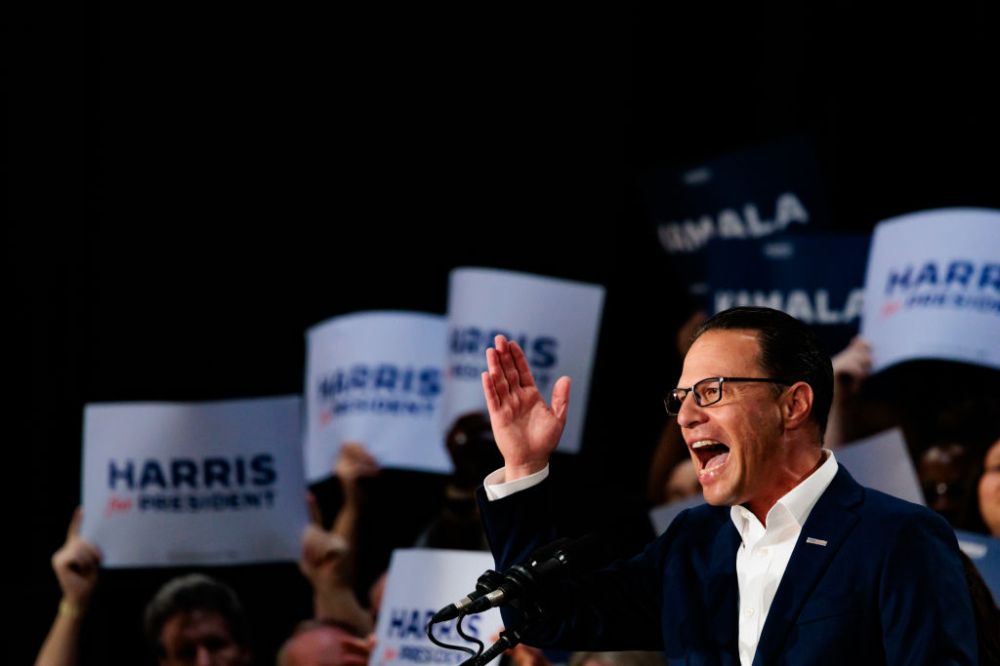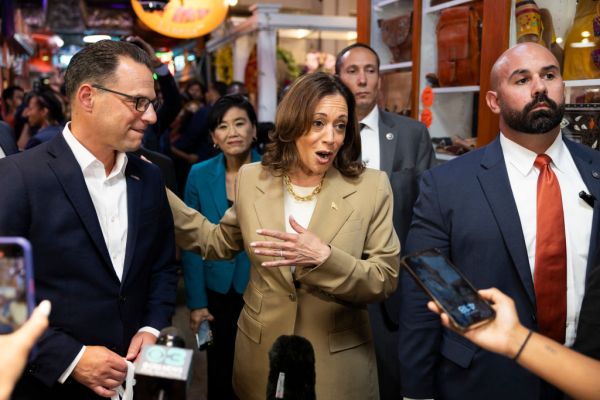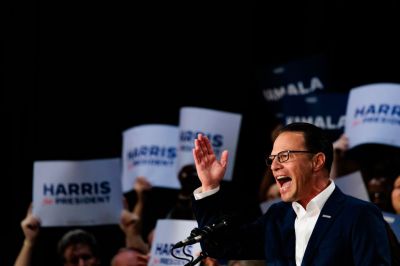The governor of Pennsylvania is extremely popular with his state’s voters. Whoever wins Pennsylvania in November will almost certainly win the presidency. Kamala Harris should therefore choose the governor of Pennsylvania to be her running mate.
Thus endeth today’s newsletter. What more is there to say?
There’s always more to say. That’s my motto, as regular readers of this interminably long daily column know.
Harris has yet to announce her selection as I write this on Monday but the only serious contender left beside Josh Shapiro appears to be another governor, Tim Walz of Minnesota. And if I squint hard, I can kind of see why she might prefer Walz.
Not really, but kind of.
If you believe Harris’ greatest electoral liability is with working-class voters who are drifting away from the left, Walz is arguably superior to Shapiro. Former Ohio Rep. Tim Ryan, himself a working-class Midwestern Democrat, made the case for the Minnesotan in an op-ed Monday. Walz is “a high school teacher, a football coach, and a 24-year veteran of the Army National Guard,” Ryan wrote. “Born and raised in a small town, he has spent his career working on agriculture, veterans, and rural issues—key areas that resonate with voters in the Midwest and beyond.”
He’s neither a businessman nor a lawyer by trade, as Harris and Shapiro are, which gives Walz a degree of populist credibility that’s rare nowadays among the leaders of a party run by, and increasingly for, the professional class. He’s also unapologetically progressive, especially on labor issues, and displays a no-nonsense common touch in public appearances. He’s pugnacious in television interviews too, a quality that’s built him a national fan base in the span of a few weeks. He might plausibly be a better attack dog against Republicans on the trail than Shapiro.
He’s the populist choice, simply put, a Sherrod Brown type whom Trumpy rural Midwestern voters might find relatable despite his ardent leftism. And maybe Kamala Harris needs that, as those voters are apt to find her not so relatable—not because of her race and sex (or not just because of that) but because she hails from the same overeducated technocratic class that now dominates Democratic politics.
You want “balance” on the ticket? Then you need Walz, a beer-track guy in a party dominated by wine-trackers like Shapiro and Pete Buttigieg.
Because he’s the closest thing on the menu to Bernie Sanders, choosing Walz could also provide left-wing cover for Harris to tack toward the center aggressively on policy. Her flip-flopping so far has been low-key and conducted through campaign statements; once she starts doing debates and interviews, progressives will pay closer attention to her reversals and grow irritated at seeing her abandon the hard-left positions she took as a candidate in 2019.
Throwing them a bone by picking Walz will ease that irritation and sustain the sense of unity in the party that’s prevailed since she replaced Joe Biden as nominee. No matter how Harris positions herself on policy thereafter, leftists will have the consolation that one of their own is on the ticket and poised to be a credible presidential candidate himself in 2028 or 2032.
Walz wouldn’t be a terrible pick the way Buttigieg, say, would be terrible. But I still prefer Shapiro. And not just for the obvious reason that if you absolutely must win Pennsylvania, you should probably choose the guy who’s most likely to win you Pennsylvania.
Run to the center.
I want Harris to win because I want Donald Trump to lose, and I suspect Shapiro would do more than Walz to make that happen.
Although I confess to not entirely trusting my own analysis here.
After all, it’s too convenient for a conservative to believe that a center-left running mate would earn more votes than a hard-left running mate would. I prefer Shapiro to Walz because he’s a bit closer to me on policy and so surely it must follow that swing voters will prefer him too, no?
Not necessarily. Whatever good Shapiro does for Harris with centrist voters could be undone and then some by disaffected progressives who boycott the race in protest of his selection. Whereas Walz could turn out the left in droves and still do reasonably well among centrists, if not quite as well as Shapiro, by dint of his populism.
But I doubt it. The strategic calculation for Harris starts here: What perception of her own politics does she most need to “balance” with her choice of running mate?
The answer, of course, is that she’s too left-wing. The Trump campaign has hours of footage of Harris taking far-left positions on the trail as a Democratic primary candidate in 2019, some of which has already been featured in Republican ads down ballot. Trump’s going to spend the next three months calling her a not-so-secret communist who’s feigning moderation at the moment and will revert to her radical roots once in office.
Which running mate is more likely to counter that impression as voters begin forming opinions about her? The center-left Shapiro or the hard-left Walz?
Shapiro supports school vouchers, has tough-on-crime credentials as a former attorney general and clemency-board member, opposes tearing down monuments to colonial-era statesmen, and seems to disdain the anti-anti-Hamas crowd on campus almost as much as Republicans do. He ran ahead of Hillary Clinton and Joe Biden in his home state in 2016 and 2020, respectively, and did well in red areas of Pennsylvania four years ago. “Shapiro got a slightly lower vote share than Biden did in Philadelphia and the key suburban counties nearby,” the New York Times reported on Friday, “but he outperformed Biden in western and rural parts of the state, which are typically more conservative. That might mean he could help Harris in parts of the state where Democrats typically lose.”
Many anti-Trump conservatives bear Democrats a grudge for describing the threat of a second Trump presidency in existential terms while doing nothing to moderate on policy for the sake of building a winning coalition with them. Prominent Republicans are willing to go to bat for Harris against the common enemy despite her reputation for being further left than Biden; what they need from her is a gesture to show Nikki Haley voters that Harris is more moderate than they had believed. Choosing Shapiro over Walz is her opportunity to do that.
All of this is up in smoke if snubbing Walz really would trigger a significant left-wing backlash, but I’m with Tim Miller in believing that threat is overhyped. Most leftists are giddy at having been unburdened by what has been and are now laser-focused on what can be. The Shapiro versus Walz debate, Miller writes, is “taking place in a hermetically sealed bubble among political hobbyists who have extremely strong feelings about the ideological trajectory of the Democratic primary … and nobody else. They are a fraction of a fraction of the party.”
My strong suspicion is that any progressive who’s willing to stay home or vote for the Green Party because a guy they’d never heard of a month ago was passed over for VP was always going to find a reason to stay home or vote for the Green Party. The rest will be there early on Election Day no matter who Harris’ running mate is. In which case, why not choose the guy who’s more likely to make swing voters feel comfortable?
Who knows? The Trump ads about “Commie-la” might even bring some disgruntled leftists back around to her side.
The Jewish question.
Tim Walz would be a bolder choice than Josh Shapiro in some respects. He’s more of an ideologue, as I’ve explained, and the electoral upside of choosing him is riskier given Shapiro’s stature in the most important swing state.
But there’s one way in which choosing the Pennsylvanian would be arrestingly bold. He’s Jewish, and the American left’s feelings about Jews in 2024 are, shall we say, complicated. Enough so that anchors on major news networks have mused openly of late about the political “risk” Harris would be taking in selecting Shapiro.
The most influential progressive in America, Bernie Sanders, is Jewish. The governor of Illinois, J.B. Pritzker, is also Jewish and quite popular on the left. By no means have the Walz-loving Bernie bros of the Democratic Party let their hostility to Israel inform their opinion of Jewish politicians generally.
But it is true that modern progressives increasingly divide Jewish leaders into “good Jews” and “bad Jews” based on their support for the Jewish state. And “bad Jews” like Josh Shapiro come under special suspicion even when their position on Israel is all but indistinguishable from Tim Walz’s or Mark Kelly’s or any other potential vice presidential pick’s.
Among the shortlist, only Shapiro gets tagged as a genocide enthusiast, “the one pick who could potentially ruin Democratic unity.” That’s the “risk” Harris would be running in selecting him: By elevating a “bad Jew” to the West Wing, she’d be flouting the sotto voce progressive belief that Zionist Jews can never be trusted to be tough and clear-eyed where Israel is concerned. Their alleged “dual loyalty” will get in the way.
The governor is no Likudnik—on the contrary—but putting a Jew on the ticket after months of ugly agitation by the “from the river to the sea” crowd would have the feel of a rebuke by Harris. It might be received as a “Sister Souljah moment” even if she took care not to frame her decision that way, as I expect she would not. (“Forget about claiming we’re the only party standing against anti-semitism,” one Senate Republican staffer told Jewish Insider about a potential Harris-Shapiro ticket.) If her strategy is to convince centrist voters that she’s not the loony leftist they thought she was, few things would communicate that more tersely than running with a guy named Shapiro whom progressives don’t like.
Which is not to say that her strategy will pay off, especially if Iran’s war with Israel expands to Lebanon and refocuses American politics on the region. Already Trump is trying to exploit leftist suspicion of Shapiro by warning that if Harris picks him she’s going to “lose her little Palestinian base.” Maybe—but what she loses on the left she might pick up in the center among Israel supporters who are trying to talk themselves into voting Democratic but keep bumping up against the left’s radicalization over “settler colonialism.” Those voters exist, you know.
We also shouldn’t discount the effect tribal partisanship might have in cross-pressuring the base on both sides. Some progressives who greet Shapiro’s selection suspiciously will come to feel defensive on his behalf as the right attacks him; some nationalists who greet his selection as the least bad option will grow hostile toward him as Harris’ chances of winning improve. It’s an open question as to which party’s garbage populist fringe will sound more antisemitic about him as the campaign winds on.
I’m eager to see how it shakes out. I like clarity in politics, and we’ve had a lot of it since 2015. Putting Josh Shapiro on the ticket would give us a bit more. Let’s find out just how low the two ends of the political horseshoe are willing to go.
The irony is that, if Harris-Shapiro sweeps to victory despite progressive resistance, he’s apt to become one of the left’s best friends in the White House. “The truth is that whatever Shapiro’s views, a Jewish vice president would function in precisely the opposite manner from what [his] critics fear,” Yair Rosenberg wrote recently for The Atlantic. “Far from a sinister Semitic Svengali suborning the president to an Israeli agenda, a Jewish veep would be trotted out to defend Harris in her inevitable conflicts with Israel’s right-wing government, and to insulate the boss from charges of anti-semitism.”
That’s exactly right. Josh Shapiro would almost certainly end up as a fig leaf for a more pro-Palestinian U.S. foreign policy. Progressives are looking a gift horse in the mouth.
Just desserts.
There’s one more reason to root for Shapiro, courtesy of Chris Christie. Call it “poetic justice.”
Donald Trump created Josh Shapiro, Christie claimed in an interview on Sunday. And now the governor might be the agent of his political demise.
That’s not exactly true, but it’s true enough.
It’s true that Trump endorsed Doug Mastriano, a kook among kooks, in the 2022 Republican gubernatorial primary in Pennsylvania. It’s also true that Mastriano’s kookery made him a weak candidate and exceedingly easy to beat—so much so that Shapiro ran ads during the Republican primary promoting Mastriano.
Shapiro ended up beating him by 15 points, a margin gaudy enough to have helped carry John Fetterman to victory in that year’s Senate race elsewhere on the ballot. The governor emerged with a mystique similar to Ron DeSantis in Florida as a politician formidable enough to win by a landslide in an evergreen swing state. If not for Trump, DeSantis would probably be on the national ballot this year. By the time you read this, Shapiro might be on it as well.
Christie did get one important thing wrong, though. He implied that, but for Trump’s endorsement, Mastriano wouldn’t have won. In reality, Trump withheld his endorsement in that race until three days before the primary. By that point, Mastriano was already up 12 points in the polls and was probably unstoppable.
This wasn’t a repeat of what Trump did in Ohio that year, where he sent J.D. Vance to a come-from-behind victory in the Senate primary by endorsing him. (Another endorsement with major implications for 2024, it turns out.) This was a case of Mastriano seemingly running away with his race and Trump deciding at the last second that he might as well endorse him in order to claim a bit of credit for Mastriano’s impending victory.
It wasn’t Trump who created Josh Shapiro by sending a populist tomato can to face him in the general election, in other words. It was Republican primary voters. They preferred Mastriano, just as they usually prefer cranks as nominees to more electable candidates—even in swing states, where they have every reason to know that the path to victory runs through appealing to the center.
The 2022 midterms were full of terrible decisions like that. Mastriano and Mehmet Oz in Pennsylvania, Kari Lake and Blake Masters in Arizona, Herschel Walker in Georgia: Republican voters swooned for the weirdest slobs in the party. They cost themselves three Senate seats and a couple of governorships that year because they were unable or unwilling to grasp that the most MAGA candidate in the race is not the candidate that’s most likely to win.
Then they turned around in 2024 and did the same thing in their presidential primary by choosing a twice-impeached, coup-plotting convicted felon with obvious mental problems over DeSantis and Nikki Haley. At best, Republicans voters remain wildly deluded about the broader national appeal of the politicians whom they like best. At worst, they’re indifferent to winning and wielding power and have come to see primaries as little more than referendums on what the right should stand for.
Last week on The Remnant, John Podhoretz of Commentary wondered when the GOP’s populist base will finally have the sort of reckoning with political reality that conservatives were forced to have in 2016. Trump proved that year that the grassroots right didn’t care about most of the things it had claimed for years to care about. Reaganites had to face that and accept that they’d misunderstood what voters wanted. Trumpists have somehow avoided the same reassessment despite losing the House in 2018, losing the presidency and the Senate in 2020, and losing many more congressional races than expected in 2022 in one of the worst midterm performances for the out-party in decades.
Instead of accepting that they’ve misunderstood what voters want, Podhoretz noted, the fragile MAGA movement copes with its unpopularity by retreating into fantasies about rigged elections. That’s how Mastriano, a conspiracy theorist, got traction in Pennsylvania in the 2022 primary, in fact. And now here we sit, waiting to see if the guy who clobbered him in the general election that year will join the national ticket and deliver the presidency to Democrats on a silver platter.
It would be the tastiest of just desserts if Donald Trump’s political career were to end at the hands of a politician whose own path to power was paved by the populist right’s juvenile, self-destructive radicalism. That’s reason enough to hope Josh Shapiro is Harris’ pick. We’ll know soon.







Please note that we at The Dispatch hold ourselves, our work, and our commenters to a higher standard than other places on the internet. We welcome comments that foster genuine debate or discussion—including comments critical of us or our work—but responses that include ad hominem attacks on fellow Dispatch members or are intended to stoke fear and anger may be moderated.
With your membership, you only have the ability to comment on The Morning Dispatch articles. Consider upgrading to join the conversation everywhere.